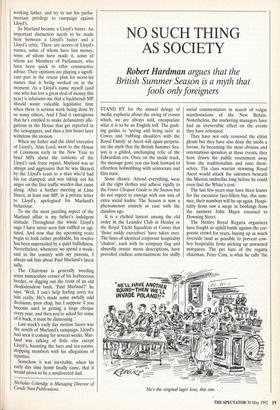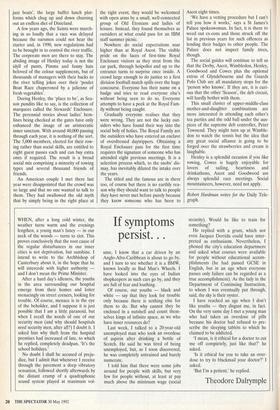NO SUCH THING AS SOCIETY
Robert Hardman argues that the British Summer Season is a myth that fools only foreigners
STAND BY for the annual deluge of media euphoria about the string of events which, we are always told, encapsulate what it is to be an English toff. The gush- ing guides to 'seeing and being seen' at Cowes and 'rubbing shoulders with the Royal Family' at Ascot will again perpetu- ate the myth that the British Summer Sea- son is a gilded, unchanging relic of the Edwardian era. Once on the inside track, the message goes, you can look forward to effortless hobnobbing with aristocrats and film stars.
Some chance. Attend everything, wear all the right clothes and adhere rigidly to the Veuve Clicquot Guide to the Season but do not expect to emerge with one iota of extra social kudos. The Season is now a phenomenon entirely at ease with the classless age.
It is a cliched lament among the old order in the Leander Club at Henley or the Royal Yacht Squadron at Cowes that 'those ruddy executives' have taken over. The lines of identical corporate hospitality 'chalets', each with its company flag and absurdly ornate menu descriptions, have provided endless entertainment for sniffy social commentators in search of vulgar manifestations of the New Britain. Nonetheless, the marketing managers have had an irreversible effect on the events they have colonised.
They have not only removed the elitist gleam but they have also done the snobs a favour. In becoming the most obvious and ostentatious spenders at these events, they have drawn the public resentment away from the traditionalists and onto them- selves. The class warrior storming Royal Ascot would attack the salesmen beneath the Martini umbrellas long before he could even find the White's tent.
The last few years may have been leaner for the executive face-fillers but, this sum- mer, their numbers will be up again. Hospi- tality firms saw a surge in bookings from the moment John Major returned to Downing Street.
The Henley Royal Regatta organisers have fought an uphill battle against the cor- porate crowd for years, buying up as much riverside land as possible to prevent cow- boy hospitality firms sticking up unwanted marquees. The pet hate of the regatta chairman, Peter Coni, is what he calls 'the 'He's the original lager lout, this one. .
jazz boats', the large buffet lunch plat- forms which chug up and down churning out an endless diet of Dixieland.
A few years ago, the Saints were march- ing in so loudly that a race was delayed because the oarsmen could not hear the starter and, in 1990, new regulations had to be brought in to control the river traffic. The corporate men are there to stay. The abiding image of Henley today is not the idyll of punts, Pimms and funny hats beloved of the colour supplements, but of thousands of managers with their backs to the river telling jokes over their `poulet Boat Race chaperoned by a julienne of fresh vegetables'.
During Henley, the 'place to be', as Sea- son pundits like to say, is the collection of marquees called the Stewards' Enclosure. The perennial stories about ladies' hem- lines being checked at the gates have only enhanced the image of an aristocratic inner sanctum. With around 40,000 passing through each year, it is nothing of the sort. The 5,000 members, elected for their row- ing rather than social skills, are entitled to eight guest passes each and can buy extra ones if required. The result is a broad social mix comprising a minority of rowing types and several thousand friends of friends.
An American couple I met there last year were disappointed that the crowd was so large and that no one wanted to talk to them. They had swallowed the old myth that by simply being in the right place at
the right event, they would be welcomed with open arms by a small, well-connected group of Old Etonians and ladies of leisure. Instead, they found themselves as outsiders at what could pass for an IBM staff summer picnic.
Nowhere do social expectations soar higher than at Royal Ascot. The visible pride on the faces of first-time Royal Enclosure visitors as they strut from the car park, through hoipolloi and up to the entrance turns to surprise once inside. A crowd large enough to do justice to a first division football match spills over the huge concourse. Everyone has their name on a badge and tries to read everyone else's without being seen to do so. Everyone attempts to have a peek at the Royal Fam- ily without being caught.
Gradually everyone realises that they were wrong. They are not the lucky out- siders who have found their way into the social holy of holies. The Royal Family are the outsiders who have entered an enclave of overdressed daytrippers. Obtaining a Royal Enclosure pass for the first time requires the signature of someone who has attended eight previous meetings. It is a selection process which, to the snobs' dis- may, has inevitably diluted the intake over the years.
The titled and the famous are in there too, of course but there is no earthly rea- son why they should want to talk to people they have never met before purely because they know someone who has been to Ascot eight times.
`We have a vetting procedure but I can't tell you how it works,' says a St James's Palace spokeswoman. In fact, it is there to weed out ex-cons and those struck off the list in previous years for such offences as lending their badges to other people. The Palace does not inspect family trees, though.
The social guides will continue to tell us that the Derby, Ascot, Wimbledon, Henley, Goodwood and Cowes plus the optional extras of Glyndebourne and the Guards Polo Club are all mandatory stops for the `person who knows'. If they are, it is curi- ous that the other 'Season', the deb circuit, will hardly bother with them.
This small cluster of upper-middle-class mother-and-daughter combinations are more interested in attending each other's tea parties and the odd ball under the aus- pices of the supreme deb controller, Peter Townend. They might turn up at Wimble- don to watch the tennis but the idea that any great social alliance is going to be forged over the strawberries and cream is laughable.
Henley is a splendid occasion if you like rowing, Cowes is hugely enjoyable for lovers of sailing, heartiness and drinkathons, Ascot and Goodwood are always splendid race meetings. Social mountaineers, however, need not apply.
Robert Hardman writes for the Daily Tele- graph.

















































 Previous page
Previous page